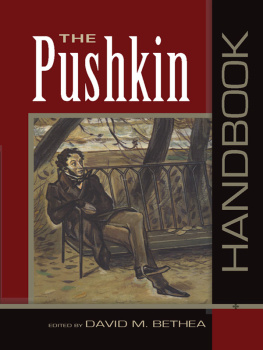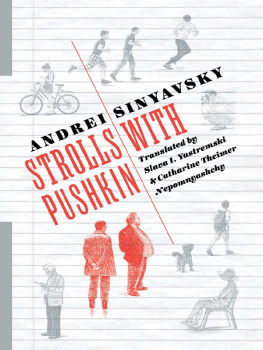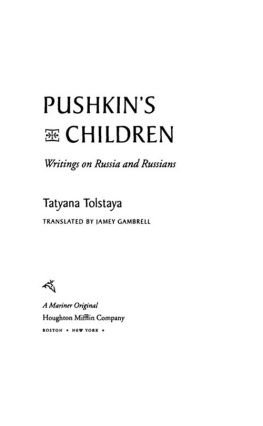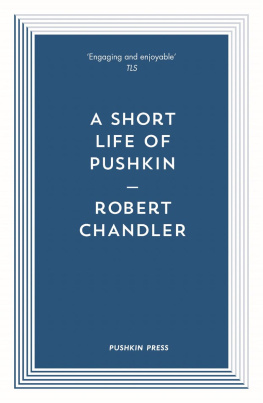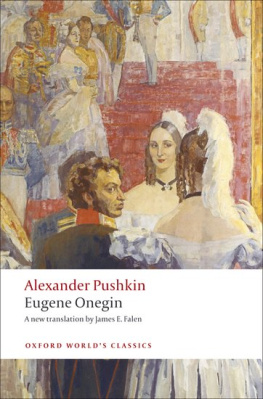PUBLICATIONS OF THE WISCONSIN CENTER
FOR PUSHKIN STUDIES
David Bethea, Alexander Dolinin
Series Editors
The Pushkin Handbook
Edited by David M. Bethea
THE UNIVERSITY OF WISCONSIN PRESS
Publication of this volume has been made possible, in part, through support from the Wisconsin Center for Pushkin Studies in the Department of Slavic Languages of the University of WisconsinMadison.
The University of Wisconsin Press
1930 Monroe Street, 3rd Floor
Madison, Wisconsin 53711-2059
uwpress.wisc.edu
3 Henrietta Street
London WC2E 8LU, England
eurospanbookstore.com
Copyright 2005
The Board of Regents of the University of Wisconsin System
All rights reserved. No part of this publication may be reproduced, stored in a retrieval system, or transmitted, in any format or by any means, digital, electronic, mechanical, photocopying, recording, or otherwise, or conveyed via the Internet or a website without written permission of the University of Wisconsin Press, except in the case of brief quotations embedded in critical articles and reviews.
Printed in the United States of America
Library of Congress Cataloging-in-Publication Data
The Pushkin handbook / edited by David M. Bethea.
p. cm. (Publications of the Wisconsin Center for Pushkin Studies)
English and Russian.
ISBN 0-299-19560-0 (cloth : alk. paper)
1. Pushkin, Aleksandr Sergeevich, 17991837Criticism and interpretation.
I. Bethea, David M., 1948II. Series.
PG 3356.p818 2005
891.713dc22
2005011162
ISBN 978-0-299-19564-9 (pbk. : alk. paper)
ISBN 978-0-299-19563-2 (e-book)
Contents
D AVID M. B ETHEA
D AVID M. B ETHEA
D AVID M. B ETHEA
D AVID M. B ETHEA and S ERGEI D AVYDOV
..
..
.
..
J. D OUGLAS C LAYTON
L ESLIE OB ELL
.
P AUL D EBRECZENY
D AVID M. B ETHEA
S ERGEI D AVYDOV
C ARYL E MERSON
L AUREN G. L EIGHTON
..
W ILLIAM M ILLS T ODD III
H ARSHA R AM
S TEPHANIE S ANDLER
A LEXANDER D OLININ
..
..
B ORIS G ASPAROV
..
B ORIS K ATZ and C ARYL E MERSON
S VETLANA E VDOKIMOVA and V LADIMIR G OLSTEIN
A Note on Transliteration
Slavic scholars writing in English have long struggled with the problem of transliteration. To be completely consistent with a given scholarly system, say the Library of Congress (Dostoevskii, Chaikovskii, Nikolai I, Tatiana, Lidiia), would mean to ignore certain names that have become well-known in our own cultural context by more popular spellings (Dostoevsky,Tchaikovsky,Nicholas I,Tatyana,Lydia). However, to adopt a more hybrid system, which takes into account these established imports and thereby seems less intimidating to the non-specialist (why this should be intimidating is another question) creates its own set of problems. We have tried to respond to this issue by recognizing the names that have become willy-nilly Englished in the card catalogue of our University of Wisconsin Library: thus, B. V. Tomashevskii (a typical LC entry), because the scholar, while in this instance very distinguished, is still better known in the Russian-language context and because in that context the convention is to provide initials rather than a first name, but Vladimir Mayakovsky (which could just as easily have been V. Maiakovskii) because that is how the name appears in our and other North American libraries data bases. Thus, where the writer, particularly if relatively famous, is usually known by his first and last name (Aleksandr Blok, Andrei Bely, etc.), the individual who for whatever reason has not crossed over into Anglophone cultureagain, the degree of acceptance may be quite relativeis rendered in the Russian fashion (E. A. Baratynskii rather than Evgeny Baratynsky). In the endnotes where we are citing sources in the original Russian we have used consistently the Library of Congress system with diacritical marks omitted.
Preface
Like anything published in recent years on a so-called scholarly topic, The Pushkin Handbook reflects a dynamic and at times uneasy relationship to the ambient academic culture. By that I mean that, on the one hand, any such undertaking must take into account practical issues like readership, print run, page count, marketing and production costs and, on the other, it must fill a need through its conceptual framework and contents that is real, worthwhile, capable of standing the test of time. Clearly, these two ends of the academic book-publishing gauntlet do not always leave the aspirant unbloodied, so to speak. As we hear over and over again from acquiring editors and their colleagues in marketing departments, what is purely scholarly (the term often has pejorative connotations at editorial board meetings) doesnt sell. Either the issue addressed is too narrowly specialized, or the manuscripts appearance is top heavy with footnotes and bibliography, or the manner of presentation is, well, boring. Furthermore, matters are not helped by the fact that literary studies proper have fallen on hard times, perhaps deservedly so, and have been increasingly replaced by studies that treat literary texts as simply one category among many different, each equally valuable and equally readable, cultural artifacts, or, to continue the metaphorical slide sideways, texts.
Thus, as readerships, or interpretive communities, continue to break up into ever smaller units, units that are less and less likely to talk with one another, we face, mutatis mutandis, the same tug-of-war between inspiration and use (polza), poet and bookseller, of which Pushkin himself spoke as he inaugurated his great novel-in-verse Eugene Onegin. The academic marketplace, which in principle is not supposed to mimic its economic counterpart, has in fact begun to look more and more like it, with politics and topicality and other art forms (especially cinema) being more and more the style du jour. As much as this may sound like a lament, it is not. It is merely trying to state things as they are, with the hope that The Pushkin Handbook can take its proper place against this background of givens and find its audience. We have tried to make our study serious; we understand it is not for everybody (though the idealists in us think it should be!); we obviously dont believe it is boring, but then again we realize it may take some effortsome background reading, some prior knowledge of the topic, some desire to extend oneself beyond the bounds of undergraduate generalitiesto enter its different viewpoints and intellectual complexities. The phenomenon of Aleksandr Pushkin may not be for everybody, but it is our underlying conviction that he is for anyone interested in understanding Russian literature and culture, its history, mythopoetic dialogue, internal dynamics.
First of all, what is meant by the title The Pushkin Handbook? In this strategically organized collection of articles we have tried to build on the accomplishments of Russian/Soviet scholarship, especially the latters attention to philological concerns and historical context, without repeating that traditions failings, including, first and foremost, its ethnocentric ardor and self-congratulatory teleological (Marxist) thinking. In 1966, as Brezhnev was consolidating control in the post-Khrushchev era and long before his policies had congealed into the sticky morass known as zastoi (period of stagnation), leading Soviet Pushkinists published a collective monograph entitled Pushkin: Itogi i problemy izucheniia (

